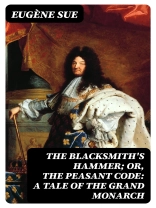Eugène Sue’s ‘The Blacksmith’s Hammer; or, The Peasant Code: A Tale of the Grand Monarch’ is a vivid and compelling narrative set against the tumultuous backdrop of 17th-century France. The novel integrates elements of historical fiction with social commentary, offering a penetrating exploration of class struggles and the moral dilemmas faced by those at the fringes of society. Sue employs a richly evocative literary style that combines descriptive imagery with a fast-paced plot, drawing readers into the turbulent world of peasant life and the oppressive grip of monarchical power, while also reflecting the broader themes of justice and retribution revered in Romantic literature. Eugène Sue, a prominent figure in the French literary scene, was deeply influenced by the socio-political issues of his time, particularly the growing disparity between the ruling elite and the impoverished masses. His background as a physician alongside his fervent advocacy for social justice informed his writing, making him a pioneer of social realism in literature. ‘The Blacksmith’s Hammer’ stands as a testament to his commitment to illuminate the plight of the disenfranchised. This captivating tale is highly recommended for readers who are fascinated by historical narratives that blend engaging storytelling with profound social critique. Sue’s insightful portrayal of human resilience against tyranny is not only entertaining but also thought-provoking, offering a lens through which to examine enduring issues of power and inequality.
关于作者
Eugène Sue (1804–1857) was a prolific French novelist whose works reflect a potent blend of social commentary and vivid melodrama. He achieved widespread popularity in the 19th century, particularly for his serialized novels. Born into a prosperous bourgeois family, Sue served as a ship’s surgeon before embarking on his literary career. His experiences at sea, which exposed him to diverse cultures and social inequities, heavily influenced his writing. A champion of the marginalized, Sue’s works often highlighted the struggles of the poor and disenfranchised, exemplified in one of his masterpieces, ‘The Blacksmith’s Hammer; or, The Peasant Code: A Tale of the Grand Monarch.’ This novel delves into the challenges faced by peasants under Louis XIV’s oppressive regime, showcasing Sue’s commitment to social reform. Sue’s literary style is characterized by its lush, emotive prose and intricate plotlines that captivate readers while unashamedly advocating for societal change. His monumental work, ‘The Mysteries of Paris, ‘ further cemented his reputation as a pioneer of the serial novel and an influential figure in the advent of the social novel genre. Despite his death in the mid-19th century, Eugene Sue’s narratives remain significant for their historic insight and their enduring call for justice and empathy towards the less fortunate.












